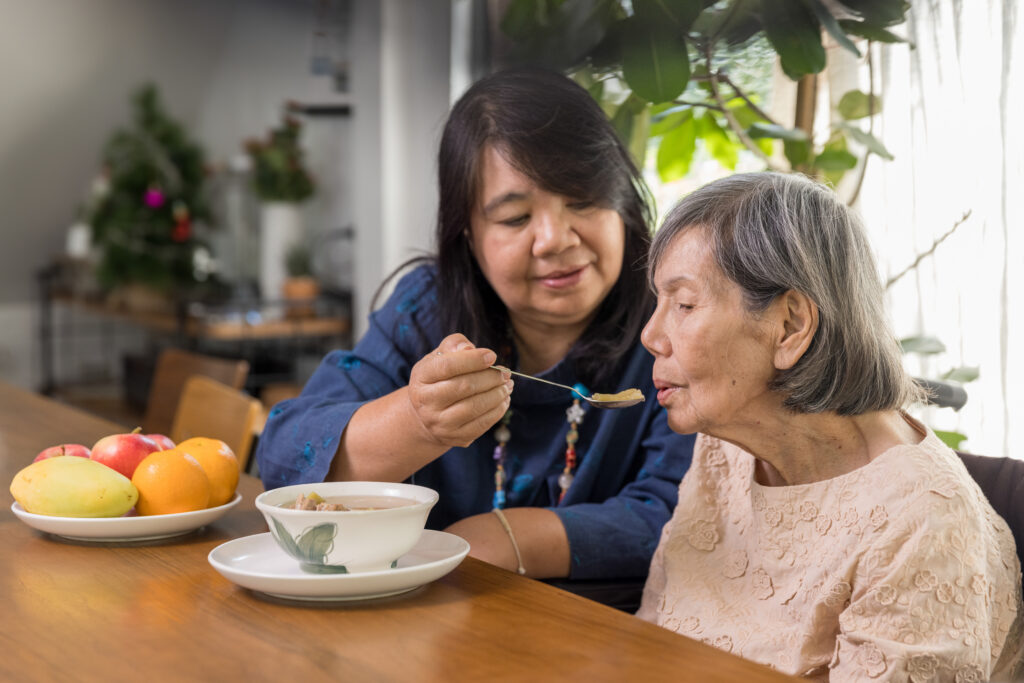As we age, our bodies undergo various changes that include shifts in appetite and dietary preferences. Decline in appetite is a concern among the aging population, often leading to inappropriate nutrition and potential health problems. Therefore, understanding the factors behind this decline and implementing effective strategies to manage them is crucial in improving the quality of life and well-being of our beloved aging loved ones. In this blog we will delve into some of the factors leading to age related appetite decline and explore practical ways to manage this issue.
Older adults can experience poor appetite as a result of any of these:
- Chronic Illness: underlying health conditions such as heart disease, diabetes, or gastrointestinal issues can affect one’s appetite. Chronic pain or discomfort might also contribute to reduced interest in eating.
- Physiological Changes: Aging brings about changes in taste and smell receptors, thus making food seem less flavorful. Additionally, seniors might experience reduced stomach acid production, hence affecting digestion and nutrient absorption.
- Metabolism Slowdown: The elderly generally have a slower metabolic rate, which leads to a decreased caloric requirement. This can eventually result in smaller meals and reduced appetite.
- Medications: As we continue to age, our health decline, most times requiring medications to make us feel better. However, these medications together with their side effects sometimes affects people’s taste for food. Some of these medications can suppress hunger or alter taste perception.
- Social and Emotional Factors: Due to some life changing events, like loss of spouse or close family member, some older adults find it very difficult to come out of that shock or even participate in any social activities. This often time cause loneliness, depression and anxiety.
Ways you can manage poor appetite:
- Nutrient-rich Diet: Offer meals that are nutritious, foods that are rich in vitamins, minerals, and protein. Dairy products, whole grains, fruits, and vegetables can help meet nutritional needs even with smaller portions.
- Frequent Smaller meals: instead of taking three large meals on a daily basis, older loved ones are encouraged to have several smaller meals throughout the day. This approach can make eating more manageable and less overwhelming.
- Flavorful and Appealing Foods: Experiment with herbs, spices, and seasonings to enhance the taste of meals. Preparing visually appealing dishes can also stimulate appetite.
- Hydration: Staying hydrated is essential for overall health and appetite. Offer water, herbal teas, and fluids-rich foods like fruits and soups.
- Social Dining: Eating alone can be less enjoyable. Seniors are encouraged to share meals with family or friends, participate in group dining at senior centers, or engage in virtual meal times with loved ones.
- Regular Exercise: Physical activity can stimulate appetite and improve digestion. In order to determine suitable exercise routines for seniors, a healthcare professional should be consulted.
- Consult Healthcare Professionals: If appetite decline persists, consult a registered dietitian or a doctor. They can identify any underlying health issues, adjust medications, and provide personalized dietary recommendations.
- Use of Supplements: In some cases, nutritional supplements might be recommended to bridge nutrient gaps. However, it is best to consult a healthcare professional before incorporating supplements.
To wrap it up, understanding and managing appetite decline in seniors requires a holistic approach that considers psychological, physiological, and environmental factors. By offering nutrient-rich foods, creating enjoyable dining experiences, and addressing any underlying health issues, we can help ensure that our elderly loved ones maintain proper nutrition and lead fulfilling lives in their golden years. Finally, you need to remember that each individual is unique, so it is important to tailor strategies to their specific needs and preferences.

